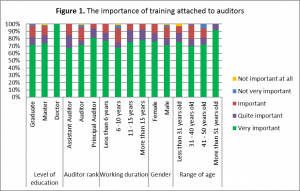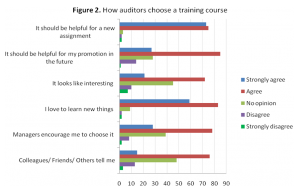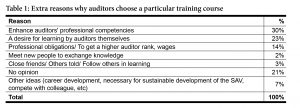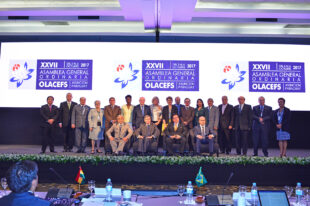Training for State Auditors

by Nguyen Thuan Lien, State Audit Office of Vietnam
Introduction
Human resources are the most valuable asset in each organization and there is a relationship between human resource management and organizational performance. In the field of state audit, failure in human resource management would negatively impact the overall performance of a supreme audit institution (SAI). In an endeavour to develop human capital competencies in SAIs, training is introduced as one of the main methods to do so . INTOSAI also encourages SAIs to consider training as a continuous process and adapt it to their individual needs. In his September 2011 speech given at the Nanjing Audit University in China on the critical role of auditor training, Dr. Josef Moser, the Secretary General of INTOSAI and the President of the Austrian Court of Audit, stressed that “Training is vital to strengthening government audit and to improving performance, enhancing transparency, ensuring accountability, maintaining credibility, fighting corruption, promoting public trust, and fostering the efficient and effective receipt and use of public resources for the benefit of their citizens.”
Concepts of Training
In 1971, the United Kingdom Department of Employment defined training as “the systematic development of the attitude-knowledge-skill behaviour patterns required by an individual in order to perform adequately a given task or job.” Similarly, at the beginning of the 21st century, researchers emphasized that the purpose of training needs to be considered in the context of a specific job rather than related to a person. Further research pointed out that training is primarily associated with “preparing people for certain activities delineated by technology and by organization. Others drew the most basic definition of training as the planned and systematic activities to promote the acquisition of skills, knowledge and attitudes (SKAs).
In the case of the state audit, training is perceived as “an instructor-led, content driven, structured process to facilitate a change in attitudes and behavior through the acquisition of knowledge and skills”.
The Roles of Training for Individuals and Organizations
Training plays an important and integral part in developing human resource as well as organizations. Aguinis & Kraiger drew a comprehensive conclusion that training both may affect declarative knowledge (knowledge of “what”) or procedural knowledge (knowledge of “how”), and may enhance strategic knowledge (when to apply a specific knowledge or skill). Buckley & Caple asserted that trainees may obtain “greater intrinsic or extrinsic job satisfaction” and that improves their work performance and productivity. With respect to state audit, IDI affirms that “training programs are excellent ways to give learners new skills, knowledge and techniques”.
Training can be important not only in personal development but also in organisational development. J. Pfeffer demonstrated that training is essential to high-performance work systems and considered extensive training to be one of seven practices for successful organizations. Training is also crucial to “the successful harnessing of employee commitment in the pursuit of organizational and operational goals”. Training results in organizational development and growth and along with other development activities that enable organizations to “adapt, compete, excel, innovate, produce, be safe, improve service, and reach goals”. Salas, Tannenbaum, Kraiger and Smith-Jentsch. assert that assessment of impactful training is important to continuous learning and skill development because they are frequently used in modern organizations. In particular, training is considered to be one of the most effective ways to build the professional capacities of SAIs.
Training Motivation of Employees
Motivation to participate in training could be understood as “a condition when trainees believe that training is relevant and [they] are willing to exert effort in the training environment”. It should be noted that training motivation is more attached to job prospects rather than the current situation. It has been concluded that motivation to learn can influence employees’ willingness to participate in training, the level of effort exerted during training, as well as their perseverance in applying skills after training.
Training motivation varies widely. For voluntary training, motivation is usually associated with the belief of trainees in better future employment prospects and it “leads to better learning outcomes, stronger well-being, more persistence and less drop-out”. Furthermore, the participation of employees in training and development is higher if they expect that the skills and knowledge acquired from training are instrumental to gaining extrinsic outcomes, whilst no evidence was found for a relation between the possibilities of participants in training with their workloads. Organizational influences are also pertinent. Machin & Treloar show that organizational commitment may be an indicator for trainees to demonstrate their level of readiness to undertake and benefit from training.
Training in the State Audit Office of Vietnam (SAV)
The SAV is responsible for auditing the accounts and operations of the Vietnamese government to enhance government accountability. For such a formidable task, it should have the right number of staff with the right skills and experiences, as suggested by the INTOSAI Capacity Building Committee. To meet these requirements, as one of the INTOSAI auditing standards states, the SAV “should adopt policies and procedures to develop and train SAI employees”. Since its establishment, the Auditor General and senior management of the SAV have paid great attention to training; it has been an inextricable part in the operation of the SAV.
Recently, the SAV conducted a survey on the attitudes of state auditors to internal training via Google Drive. Although the number of respondents was not high, the result revealed some interesting things about auditors’ awareness of training.
As previously stated, training plays an integral part in developing human resources. That is also evident in a specific working environment of the SAV where about 70% of respondents emphasized the very significant role of training for themselves (Figure 1). Noticeably, almost all respondents agreed with the importance of training whilst only a few respondents said that training was not very important or not important at all.
Examining how auditors choose a training course (Figure 2), almost all respondents at least agreed with all six suggestions. “Courses deemed helpful for new assignments” gained the highest votes of “strongly agree”. It was also the most convincing reason compared to the rest. Interestingly, loving to learn new things” acquired a rather high rate of “strongly agree” votes, even greater than “being helpful for promotion” or “getting encouragement from managers.”
In an attempt to explore any other reasons for enrollment of auditors, open-ended questions were used in the survey. Its findings suggested that reasons varied greatly (Table 1). The most common choices for auditors were to enhance their professional competencies (30%) or to satisfy their own desire for learning (23%). These findings provided more evidence for one of the above conclusions that motivation to learn can influence employees’ willingness to participate in training, the level of effort executed during training, as well as their perseverance in applying skills after training. However, some respondents (14%) admitted that it was compulsory for them to enroll in courses.
A training course that is thought to be helpful for a new assignment or enhance auditors’ professional competencies would be the most attractive to auditors. That is also corroborated in the auditors’ answer to the question of “What would you like more of in training courses to develop your competencies?” The most popular option was that more new audit techniques and methodologies should be provided. Other demands included teamwork, soft skills and leadership training. Auditors also would like to have experienced auditors/ senior managers involved as trainers. They also wished to make separate working and training schedules.
In short, the survey showed that training was important for auditors in the SAV. It also revealed that there was a wide variety of reasons driving auditors to attend a training course. Training courses would be more attractive to auditors if auditors perceived the course would enable them to conduct audits better, to enhance their competencies, or courses would be in line with their own desire for learning. In some responses, auditors stated that it was compulsory for them to attend training courses.
Recommendations for Senior Managers
Senior managers should thoroughly understand their role in the training process. In the current context of the SAV and Vietnam, their perception of the importance of training in developing auditors’ competencies should be consistently transferred into actions as follows:
- Actively participate in training courses as trainers and develop their teaching methods, as senior managers have a wide range of experience, especially for training courses held by their own departments.
- Provide equal training opportunities for their staff.
- Assign tasks or award promotions based on auditors’ knowledge gained from training courses as soon as possible.
- Do not dispense any extra work for auditors who are in a training course.
- Encourage and facilitate auditors to enroll in training courses.
- All of the above solutions should be published and applied consistently and transparently year after year by each senior manager, especially for the head of the department.
Recommendations for the Department of Personnel
The Department of Personnel is responsible for administering all training courses within the SAV. It also makes recommendations to the Auditor General for policies on human resource development, including training. It should seriously consider some solutions as follows:
- Enhance training of new audit techniques and methodologies as well as soft skills for auditors.
- Establish teamwork and leadership as separate training courses. (One of the most outstanding features of auditing is that auditors always work in teams.)
- Recommend to the Auditor General transparent, lucid and detailed policies and guidance on incentives and rewards as well as disciplines for internal trainers. The number of training hours per year should be used as part of the criteria for annual appraisals and promotions.
- Transparently publish information on human resource development.
- Prepare guidance on career development for auditors.
Conclusions
This paper has found that training was of paramount importance for auditors. Firstly, training courses were essential for auditors to prepare for new assignments, because training courses would enhance their professional SKAs, increasing their confidence in doing new tasks. In the long run, continuous training would enable them to develop their competencies. In addition, many auditors were of the opinion that the SKAs they acquired from training would be helpful for their promotion. Although some training courses are compulsory, they are still preconditions for auditors to achieve higher salaries or positions on their career ladder.
Whilst training was generally perceived to be important for auditors, the reasons why they chose a particular training course varied widely. Courses that were believed to be helpful for undertaking new assignments were most attractive to auditors. It could be seen that a desire for doing audit well was the strongest motivation for auditors to participate in courses in the SAV. Expectation of promotion after a training course was also a driver for auditors. Other auditors enrolled in a course to satisfy their desire for learning. Nevertheless, a small number of auditors registered for a course just because attendance was made compulsory.
It is believed that if all the suggested solutions above are applied, it would encourage all audit staff to learn and apply what they learn to work. As a result, in the long run the learning culture would be established. That would lay firm foundation for the sustainable development of the SAV as a whole.








